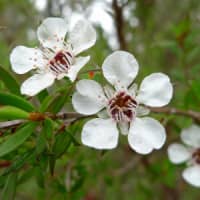Tea Tree Oil is an essential oil obtained by steam distillation from the leaves of the Melaleuca alternifolia (Myrtaceae) tree that grows naturally in Australia.[1]
The oil is used in cosmetic ingredients, such as skin and body care products, toothpaste, mouth wash and bath oils, as well as in aromatherapy products.[1:1]
Composition
Healing Properties
Antimicrobial
Tea Tree Oil is regarded as an ideal disinfectant for topical use due to its antimicrobial effect against a wide range of microorganisms even at very low concentrations, easy penetration into the skin and no irritation.[1:2]
Studies have shown that tea tree oil has a broad-spectrum antimicrobial activity with its high terpinen-4-ol content.[1:3]
Antibacterial
Antifungal
Antiviral
Disease / Symptom Treatment
Biofilms
Biofilms can have up to 1,000 times resistance to antibiotics compared with their planktonic (free-floating) forms. Biofilms are defined as communities of microbes that grow up in a matrix adhered to inert material or live tissue. Biofilm formations occur when bacteria develop a high tolerance to external stress and form the capability to colonize. Biofilms can form highly adaptive communities and may include a microbial symbiosis of different bacterial species and even different genera. Biofilms are one of the most common types of bacteria in most natural conditions. But they can occur in the natural environment and in industrial systems. Bacterial biofilms are formed in the tooth, epithelial, bone, blood vessel, and medical devices. Once rigidly established, these biofilm becomes difficult to remove due to the slime matrix produced, which leads to poor susceptibility to conventional antimicrobial agents and host defenses, resulting in chronic infections. Common Biofilm bacteria are Pseudomonas aeruginosa (gram-positive) and Staphylococcus aureus (gram-negative).[1:4]
Bladder Infection (Urinary Tract Infection or UTI)
Title: The Investigation of the Antibacterial Activity of Different Natural and Organic Agents
Publication: The Online Journal of Science and Technology
Date: October 2020
Study Type: Microbial Study: In Vitro
Author(s): Duygu ŞAHİN, Burak SAKA, Bahar KAFADAR
Institutions: Evyap Sabun Yağ Gliserin San. ve Tic. A.Ş., Istanbul, Turkey ↩︎ ↩︎ ↩︎ ↩︎ ↩︎
